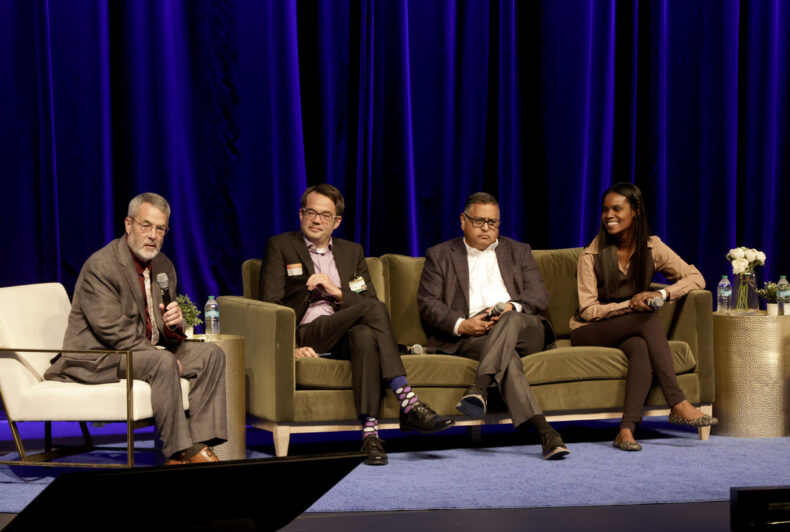Artificial intelligence is transforming the world. But AI won’t fulfill its promise to make life better for everyone unless users, consumers and patients have a say in how it’s wielded.
That was one of the take-home messages of a symposium on health care AI held Nov. 5-6 at Vanderbilt University Medical Center.
Sponsored by VUMC’s Department of Biomedical Informatics (DBMI), the symposium showcased the work of the department’s center for AI Discovery and Vigilance to Accelerate Innovation and Clinical Excellence (ADVANCE).
“There are many people who are suffering and not getting the care they need,” said Peter Embí, MD, MS, professor and chair of DBMI, who co-hosted the event. “We need to address that. A big part of that will come from the work we’re doing in AI.”
The program, “The Future of Healthcare: Bridging AI Research and Human-Centered Solutions,” concluded on Nov. 6 with a VUMC Discovery Lecture by Microsoft chief scientific officer Eric Horvitz, MD, PhD.
Horvitz traced the explosive evolution of large language models, including OpenAI’s GPT series, from the generation of human-like conversational responses to users’ questions, to a multimodal model that incorporates images as well as text.
The latest iterations include OpenAI’s o1, which tackles complex reasoning tasks by first generating long “chains of thought,” and a virtual research assistant built by Horvitz and his colleagues that reviews the scientific literature before proposing experiments to solve a problem.
“Further development in human-computer interactions is needed to realize the potential of these systems in clinical decision support,” Horvitz noted. “How might we harness this technology, which is almost like magic, for human flourishing?”
That’s a question dozens of researchers and clinicians involved in AI at VUMC are determined to answer.
Embí holds the Endowed Directorship in Biomedical Informatics and is Senior Vice President for Research and Innovation at VUMC. He co-directs the ADVANCE center with Bradley Malin, PhD, Accenture Professor of Biomedical Informatics and Computer Science, and DBMI vice-chair for Research Affairs.
They and their colleagues have helped to position VUMC and the DBMI as international leaders in the development, implementation and evaluation of advanced data analytics, machine learning, predictive modeling, generative AI and other novel and impactful technologies.
Through the ADVANCE center, they are partnering in highly collaborative ways with a diverse group of stakeholders to accelerate biomedical discovery and improve clinical efficiency and outcomes for patients.
Examples cited during the symposium included the use of AI to distinguish subtypes of asthma requiring different treatments, to abstract data used in research more efficiently from the electronic health record, and to rapidly determine whether a child has a rare disease.
Malin, who opened the symposium, predicted that AI will help humans work more efficiently and effectively, but it won’t replace them. And while he said there is a risk that AI will have unexpected and potentially harmful effects, “I think we’re going to be a lot smarter in what we’re doing.”
An important part of this effort is VUMC’s AI Patient and Family Advisory Group, which was established by ADVANCE executive director Susannah Rose, MSSW, PhD, and deputy director Laurie Novak, PhD, MHSA, both associate professors of DBMI.
The group works to ensure that the concerns, viewpoints and voices of patients and their families are meaningfully integrated into the development and deployment of AI into VUMC polices, operations and research initiatives.
“Anything less than knowing as much about patients as they know about themselves is going to leave you short,” said advisory group co-chair Donald Thielemann. “Get them up front. Have them at your shoulder as you’re doing the work. It will pay dividends for all stakeholders and, most importantly, patients.”
Thielemann acknowledged the contributions of Terrell Smith, MSN, RN, senior director of Patient and Family Engagement, to VUMC’s Patient and Family Advisory Councils. “She has been the driving force for the organization and its many, many contributions to VUMC and its patients,” he said.
It will take more than AI to fix long-standing societal problems that contribute to the high cost and uneven access to clinical care in this country. Yet that doesn’t mean health care providers should accept the status quo.
“We have a huge obligation,” saidJeffrey Upperman, MD, professor and chair of Pediatric Surgery, and Surgeon-in-Chief at Monroe Carell Jr. Children’s Hospital at Vanderbilt. “We need to engage our colleagues, our patients and our families in these really important conversations.
“I do not want retreat,” Upperman said. “I want you on that cutting edge. Ask the hard questions and be willing to deal with the answers you get.”












